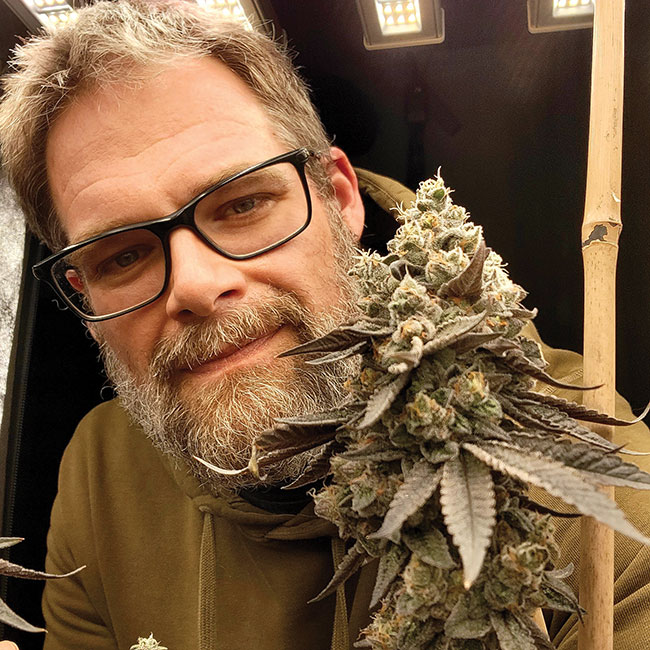
Features
Opinion
Business
Cultivation
Research
Q&A with Dustan McLean: Opting for hardy Canadian commercial cultivars
January 2, 2024 By Grow Opportunity Staff
 Dustan McLean, master grower, Nine Lions Biosciences, provides clean genetics through tissue culture and propagation.
Dustan McLean, master grower, Nine Lions Biosciences, provides clean genetics through tissue culture and propagation. After a 1994 car accident, Dustan McLean went searching for pot to treat his pain and paid $15 for a gram that was full of seed, effectively catalyzing the resourceful grower’s journey into cannabis. From popping stray beans to the creation of several legacy operations in Alberta, McLean went mainstream in 2018 with the inception of Parkland Flower (the acquisition of which led to the LP’s closure in March of this year). Though the work he was doing in genetics and seed output at Parkland encouraged his transition to Nine Lions Biosciences — a Leduc, Alta.-based tissue culture and genetics lab that headhunted the grower of nearly 30 years.
GO: One of the largest circulating issues for growers is hop latent viroid. How are you helping to minimize the risk?
DM: As soon as we pop the seed – as soon as there’s a root – it gets tested, and if it shows anything, it’s gone. Anything we bring in generally we ask to have a pre-test done to make sure it’s clean before coming into the facility, and then we do our own backup testing in house to double check it. And then if we’re still concerned, we’ll send it off to a third party and have it verified. We still get some genetics out of California for sure, but it’s from very trusted sources.
GO: Are you mostly working with Canadian genetics?
DM: A big thing for me is championing Canadian genetics and some of the breeders up here because I think the world is sleeping on what we can provide. I try to create genetics that are good for outdoor growers in Alberta and B.C. Anywhere in Canada you want to grow outdoor, I want to provide a genetic that can really work for you. In Alberta, it’s almost impossible to do outdoor photoperiod because we have the twilight here, so we’re trying to create plants that fast flowers and we’re very close to having a cultivar in Alberta that will finish in September/ early October, that’s also weather resistant, because we’ve got some crazy weather happening now.
That’s the kind of work myself and a lot of my friends are putting in, is to breed those true Canadian genetics that can withstand the harsh realities of weather in this country.
Advertisement
My Cherry Cake went 28 days without water – having something like that in drought areas is massive. We use a lot of resources to grow this plant, so having a plant that only needs 70 per cent is pretty big.
GO: What other cultivars are you excited about?
DM: I’m still a big fan of our Motorhead. It’s resistant, grows nicely and is very tasty; it’s really good for commercial use. Hash Face is a nice extract plant. Permanent Marker is another. I’m always looking two-to-three years down the line. I’m really looking into Diesels and Hazes right now and trying to get a lot of the longer running plants out onto the market. Everyone wants to get their five-and-a-half runs in every year, but they don’t realize you can do four runs with a really nice sativa, get a good quantity out of, and it’ll sell out. People are looking for the daytime weed all the time and there’s not a lot out there.
GO: What would you like to see change in this industry?
DM: I’m a big fan of our Oreo Blizzard, but it’s not high enough on the numbers. I’m trying to get people off this numbers kick. We’ve gone from THC, to CBD, to terpenes and now flavonoids. How about we just look at the plant as a whole? We’re missing some amazing genetics because of numbers, and that kills me as a breeder. There are studies coming out showing how high THC might actually be harmful. There’s a percentage of younger men going into irreversible psychosis because of high THC cannabis use in their teens. We’re morphing this plant so fast; we need to start looking at what we’re doing to this plant. I’m a big proponent of data over dogma.
GO: How do you think Nine Lions is helping shape the dialogue?
DM: We’re gathering data that will help us sell genetics for specific grows but it’s tough because every grower thinks theirs is the best. It’s tough telling people that a plant I have might be better for them commercially. They might have an amazing plant that knocks your socks off, but to grow it commercially is a nightmare. I’m trying to steer people into saving them. One of the lessons I learned was we grew a bushy crop staff needed to defoliate so much that in the end we lost money because of the overhead that went into it. We had other runs that needed no attention, and we crushed it in sales. So, you’ve got to pick your stuff smart or else you’re going to bury yourself in the burn rate on your overhead.
Print this page